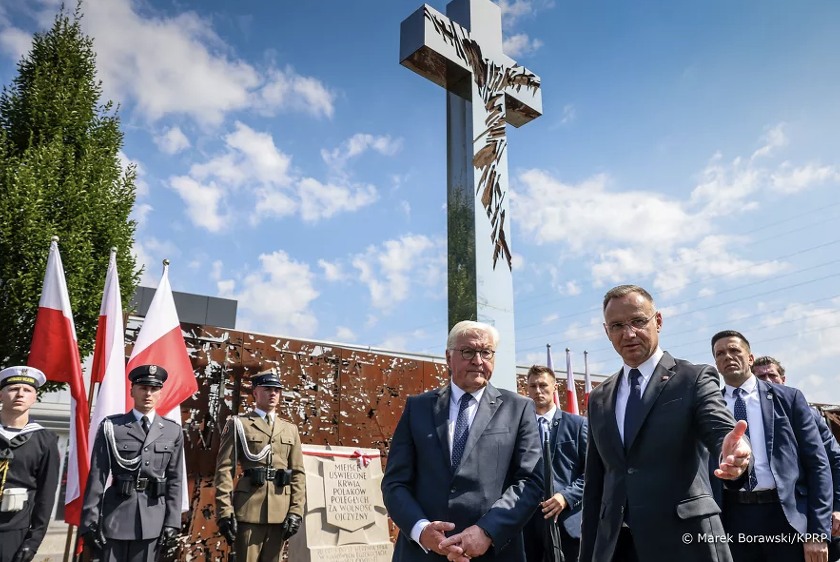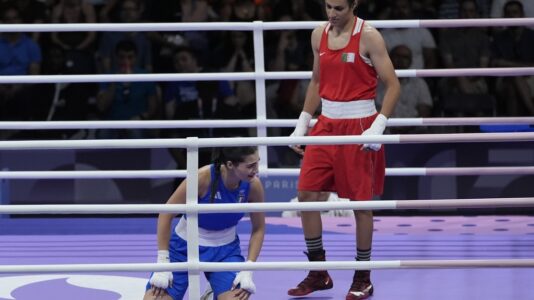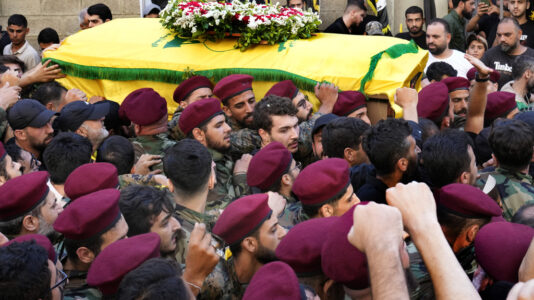On the 80th anniversary of the Warsaw Uprising, Polish President Andrzej Duda and German President Frank-Walter Steinmeier laid wreaths at the site of the largest mass execution in the Wola district, commemorating the victims of one of the most tragic episodes of the uprising initiated by Poles against German troops in August 1944.
Across Poland, sirens wailed at 5 p.m., the exact time the uprising began in 1944, while Warsaw paused for a moment of silence. Crowds gathered at significant sites such as Castle Square and Dmowski Roundabout to honor the memory of the resistance.
During the uprising, German forces committed numerous mass murders of the civilian population. The massacre in the Wola district was among the most heinous, with tens of thousands of residents killed in the first days of August 1944. Presidents Duda and Steinmeier memorialized the Wola victims at a monument in Warsaw’s Młynów area, the site of one of the worst mass executions during the uprising.
President Duda, during the ceremony, detailed the brutal actions of the SS troops who initiated the extermination of Warsaw’s population, murdering approximately 60,000 civilians in Wola by Aug. 12, 1944. “People were dragged from their homes and apartments, which were then set ablaze, while they were shot in the streets and their bodies burned,” Duda said, noting that tons of ashes were collected from the streets and squares of Wola to be placed in a mass grave.
Highlighting the importance of the 80th anniversary, President Duda emphasized not only the remembrance of the victims of German genocide but also the symbolic gesture of the German president, who “laid a wreath, bowed his head and knelt before the cross,” an act deserving of respect. President Steinmeier, who arrived in Warsaw on Wednesday to participate in the anniversary events, spoke at Krasiński Square, reminding his audience that Germany must never forget the uprising.
“We cannot and will not forget the immense suffering we brought to our neighboring country. It was German nationalism, imperialism, and racism that led to these terrible crimes, against which Poland defended itself in the Warsaw Uprising. It must never happen again,” Steinmeier stated.
During Thursday’s ceremonies at the Młynów monument, a group of demonstrators with a banner and megaphone called for war reparations, directly addressing the German president with their demands.
The massacre of Wola’s residents was part of the German strategy, on Hitler’s direct orders, to demolish Warsaw and annihilate its inhabitants. Mass executions claimed the lives of an estimated 40,000 to 60,000 residents of the district. The large-scale extermination ended by Aug. 7, though continued on a smaller scale until Aug. 12, when General Erich von dem Bach-Zelewski ordered the cessation of civilian massacres, repurposing the surviving population as forced labor for the war effort.
The Warsaw Uprising, which began on Aug. 1, 1944, at 5 p.m., was the largest armed insurrection by the underground resistance in Nazi-occupied Europe and the most significant independence movement in occupied Poland. Approximately 40,000 to 50,000 insurgents engaged in the struggle, which, planned for several days, extended over two months. During the conflict, around 18,000 insurgents died, 25,000 were wounded, and civilian casualties reached approximately 180,000. The surviving residents of Warsaw, about 500,000 in number, were expelled from the city.






